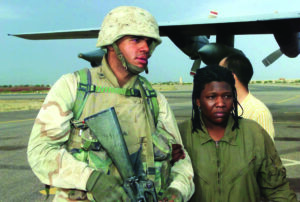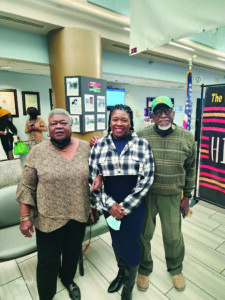
Every now and then, Shoshana Johnson finds herself questioning whether she was worthy of being rescued.
The Army veteran was part of a convoy ambushed by enemy forces in Iraq in March 2003. Seven soldiers, including Johnson, were captured. Eleven others were killed.
“There’s a lot of guilt in surviving,” Johnson said. “And sometimes you wonder if you are worthy of the gift.”
This past March, a week before the 21st anniversary of the ambush, Johnson reunited with one of the Marines who rescued her. He told Johnson the rescue was one of the greatest moments of his life but that meeting her all these years later exceeded even that. He got to know the person beyond the mission.
“His words made me feel worthy,” Johnson said. “It made me think, you know, OK, it’s been a rough 20 years, but I’m still a good person.”
Johnson is more than that. She’s a mother, a daughter, a friend, an aspiring cookbook author, a proud El Pasoan and a dedicated veterans advocate. She’s also a DAV member.
“She’s a beautiful, kind-hearted young lady—and a soldier for life,” said David Garcia, past commander of Chapter 187 in El Paso, Texas, of which Johnson is a member.
“She’s an inspiration.”
Without her community—family, neighbors and fellow veterans—Johnson said she wouldn’t have survived the past two decades and the continued work of finding peace after war.
‘THIS IS UNEXPECTED’
Johnson was born in Panama, but when her father enlisted in the Army, her family—including two younger sisters—immigrated to the United States. At 5 years old, she adopted the life of an “Army brat.”
In high school, she joined the Junior ROTC and was eager to enlist after graduation, drawn to the structure and community of the military. Her parents pushed her toward college instead.
“I had a really good time, and my grades reflected that I had a really good time,” she said.
Johnson dropped out and wandered aimlessly for a while. When she realized she wanted to foster her love of cooking and go to culinary school, her parents told her she had to do it on her own. The military, she figured, was a way to get experience and pay for school. So in 1998, at 25 years old, Johnson joined the Army as a cook.
“I was an old lady in basic training,” she joked. “Twenty-five years old and joining and I’d never run a mile in my life. So it was rough on my body.”
Johnson’s training was delayed by a broken foot and rehabilitation, but she pushed through. In May 2000, she gave birth to her daughter and decided to reenlist as a means to support her new family.
Then, 9/11 happened, and by February 2003, Johnson deployed to Kuwait with the 507th Maintenance Company from Fort Bliss, Texas.
“I didn’t think it was a big deal,” she said, noting she was keenly aware of the realities of war but wasn’t expecting to get close to combat. “So when they started talking about us moving forward, I was like, OK, this is unexpected.”
A PRISONER OF WAR
On March 20, 2003, Johnson and the 507th Maintenance Company were last in a convoy of 600 vehicles heading from Kuwait into Iraq to start the ground phase of Operation Iraqi Freedom.
Three days later, the company found itself off course in Nasiriyah, Iraq, due to a navigational error. It was there they were ambushed by the enemy.
“I remember the first shots, and it sounds like rock, just like rocks or pebbles hitting the windshield,” Johnson said.
Johnson and others took cover under one of their vehicles, at which point Johnson was shot in the ankle. It appeared, but wasn’t confirmed, that the same bullet then struck her other ankle. After running out of a means to combat enemy fire, Johnson’s sergeant made the decision to surrender.
“I get dragged from underneath the vehicle and … they beat me,” Johnson said. “I’m getting, you know, pretty, pretty banged up.”
Johnson said once the enemy realized she was a woman, they backed off and separated her from her male counterparts. She was now a prisoner of war.
“On the way to Baghdad, they would stop in every city or their little town and stuff and show off that they captured Americans,” Johnson said. “And then when we get to Baghdad, we’re interrogated and put in the prison.
“That would be the first of seven places we were taken during the whole captivity.”
A NEW NORMAL
Along with the terror of being captured, Johnson was in physical pain from her injuries. For most of her time in captivity, she was kept alone. To get through, she leaned on her Catholic faith and managed to hold on to hope.
“In my head, I built what my life would be,” Johnson said, “finding someone special, having more kids, continuing my military career.”
On April 13, Johnson was having breakfast when she heard the banging sound of a door being kicked in. The Marine Corps’ Company D, 3rd Light Armored Reconnaissance Battalion, had arrived.
Johnson was taken to a hospital in Kuwait where she had surgery the next day to repair and clean her wounds. About a week later, she arrived home, greeted by her family “and half of El Paso.”

“It was a good feeling to finally go home,” she said.
Johnson had every intention of staying in the Army. But given her physical injuries and the onset of post-traumatic stress disorder, her family convinced her it was time for a new chapter.
“I just really wanted to go back to normal,” she said. “It took years, over a decade, to realize, you know, normal for me is not normal for everybody else.”
For that first year, Johnson lived with her parents, learning how to navigate being a parent to her then 2-year-old daughter. She quickly got into mental health treatment but said she wasn’t engaged in her recovery for that first year or so. The onslaught of media coverage and public interest in the ambush—which was the same ambush in which Jessica Lynch was captured and Lori Piestewa was killed—distracted Johnson from confronting what happened.
But Johnson couldn’t avoid it for long. A community of family, friends, neighbors and veterans rallied around her. They made sure she knew she wasn’t alone and that she could reach out for help. They pushed her to take care of herself and supported her along the way.
Garcia, the past commander of DAV Chapter 187, met Johnson when she turned to DAV for help with the benefits she earned through service, specifically Combat-Related Special Compensation. She eventually became a DAV member.
“[DAV] stepped up and took care of me in a way to ensure that I was able to take care of my daughter,” Johnson said, adding that Garcia has become part of her extensive support system and keeps her and her family in the loop on legislation affecting veterans.
“I wouldn’t be here if it wasn’t for my community and my family.”
‘GOTTA KEEP GOING’
In 2011, Johnson received a degree in culinary arts from El Paso Community College, something she had set out to do when she enlisted in 1998.
“I’m very proud of that,” she said. “I fulfilled that dream.”
Ever a soldier, Johnson said she loves the structure of baking, which requires exact measurements and precise repetition. Other times, she thrives in the freedom of cooking. Either way, if she’s not in the kitchen, it’s a sign she’s not doing well.
“So sometimes I need to do that baking and do that structure, because maybe things are chaotic in my mind. And then other times when things are too regimented, I think I need to just cook something and be able to throw [in] a little this, little that,” she said.
While Johnson said she’s still figuring out her post-military dream, she has at least one passion project: writing her own cookbook.
“That is a long work in progress, but one day, I’ll get that cookbook out,” she said.
In the meantime, Johnson tries to remember that she was indeed worthy of being rescued all those years ago. When in doubt, she thinks of those who didn’t survive and feels duty-bound to honor them. She also hopes her story can help other veterans.
“I’m meant to be here,” she said. “I haven’t figured out why yet … but for those who are gone, you gotta keep going.”






